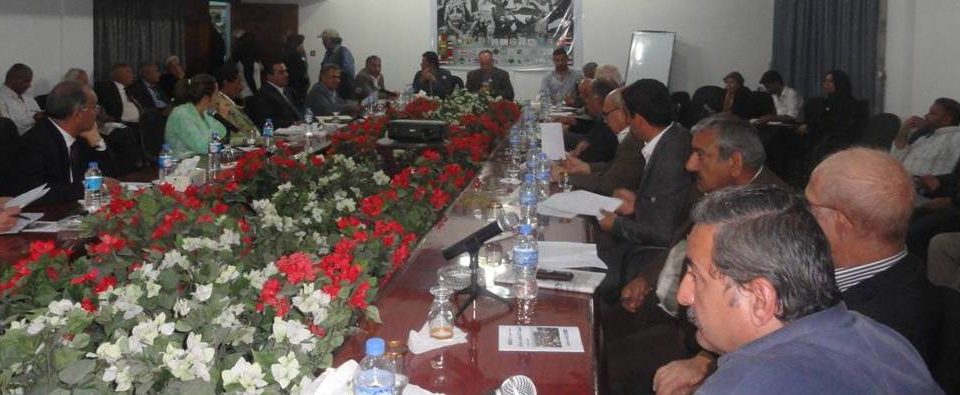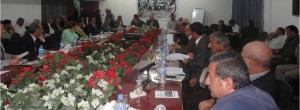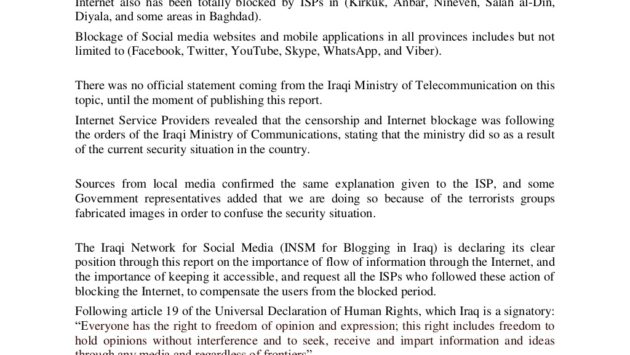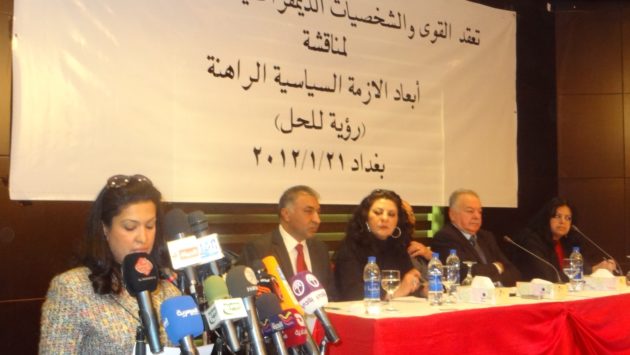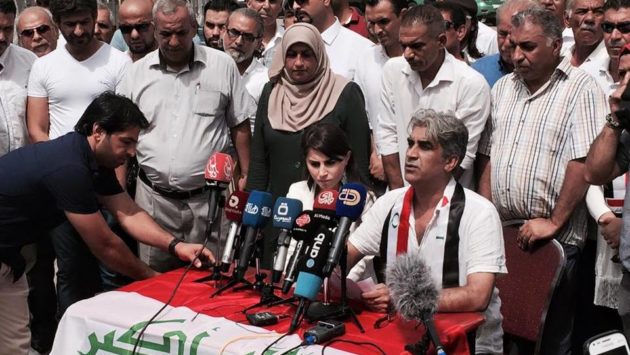Statement from the Baghdad People’s Summit: “People’s Issues! Not Rulers’ Issues”
Statement from the Baghdad People’s Summit
“People’s Issues! Not Rulers’ Issues”
A large and varied group of Iraqi civil society organizations gathered in Baghdad in the hall of the oil cultural center on 24 March 2012 for a people’s meeting held in parallel with the Arabic League Summit. Many representatives of the media and the academic community were also present. The participants focused on topics of importance to people throughout the Arab world. They organized their meeting out of concern that the Arabic League Summit “would not address issues that affect the lives of the people in Arab nations.”
This meeting, considered the first of its kind, received wide participation by Iraqi civil society despite the difficult circumstances in which it occurred. People criticized “the difficulty of moving from place to place, especially within Baghdad, as well as the harsh security and the challenging political situation.” Participants were not hopeful that the Arab League Summit would produce recommendations or actions that would address the most important concerns of people in the Arab region especially poverty, health, and education. In this regard, they feared, the Summit would be a lot like previous summits.
In order to express the people’s hopes and expectations concerning the work and activities of the Arab League, the civil society representatives organized their meeting into four sessions. In these sessions they discussed:
- The League’s structure and capacity for democratic action;
- The potential for democratic transformation of Arab states;
- Relations among Arab states; and
- The Arab Spring and the changes it continues to produce.
The first session focused on “democracy in Arab League institutions.” Participants insisted that “real democratic features” had to be added to the League’s institutions and that space needed to be opened up to allow women and youth to participate more fully and to fill leadership positions. When setting and enacting policies, the Arab League should play a role in fighting poverty and illiteracy, and promoting health, education, culture, fair elections, a strong and independent judiciary, and human rights. This work could be carried out by new, specialized organizations or by empowering existing League institutions. Participants endorsed promoting and supporting increased cooperation between civil society organizations and Arabic League institutions. Civil society organizations should become partners in Arab League programs by supporting and participating in League activities. It was also recommended that the mechanism for choosing the general secretary of the Arab League be amended so that it is no longer a monopoly of the headquarter state of the Arab League.
In the second session participants discussed future democratic transformation of Arab states. They all agreed on the necessity of the rule of law, establishing democratic institutions, promoting the principles of citizenship, and involving citizens in demanding that the state respect human rights, women’s rights, and the rights of children. Participants also supported efforts to strengthen the role of youth in the state, to defend the principle of peaceful transfer of power, and to narrow the gap between the rich and the poor in order to promote social justice. Finally, they declared that everyone who engaged in corrupt practices, regardless of their position, must be held accountable.
In the third session participants discussed relations among Arab states, agreeing on the necessity of interactions based on mutual cooperation and coordination, respecting the sovereignty of each state, and forbidding all aggressive practices, especially the use of weapons between states or by states against their people. By rejecting all forms of violence, Arab nations would most effectively cooperate to end terrorism. Participants saw the necessity and benefit of facilitating the movement of capital and goods between Arabic nations, but equally important should be cooperation in the fields of learning, educational and culture exchange, scholarships, and health. This cooperation will assure mutual peace between Arab states. All programs of the Arab League should serve the people.
In the fourth session the participants discussed the Arabic Spring, the changes that have occurred in Tunis, Egypt, Libya, and Yemen, and the violence that accompanied the revolutions that took place in Syria and Bahrain. They condemned the repressive tactics that governments used against demonstrators. Participants agreed that just as the Arabic League should employ democratic and civil procedures in building states, it should play an active role in supporting people during democratic transformation of their nations.
Statement from the Baghdad People’s Summit
“People’s Issues! Not Rulers’ Issues”
A large and varied group of Iraqi civil society organizations gathered in Baghdad in the hall of the oil cultural center on 24 March 2012 for a people’s meeting held in parallel with the Arabic League Summit. Many representatives of the media and the academic community were also present. The participants focused on topics of importance to people throughout the Arab world. They organized their meeting out of concern that the Arabic League Summit “would not address issues that affect the lives of the people in Arab nations.”
This meeting, considered the first of its kind, received wide participation by Iraqi civil society despite the difficult circumstances in which it occurred. People criticized “the difficulty of moving from place to place, especially within Baghdad, as well as the harsh security and the challenging political situation.” Participants were not hopeful that the Arab League Summit would produce recommendations or actions that would address the most important concerns of people in the Arab region especially poverty, health, and education. In this regard, they feared, the Summit would be a lot like previous summits.
In order to express the people’s hopes and expectations concerning the work and activities of the Arab League, the civil society representatives organized their meeting into four sessions. In these sessions they discussed:
- The League’s structure and capacity for democratic action;
- The potential for democratic transformation of Arab states;
- Relations among Arab states; and
- The Arab Spring and the changes it continues to produce.
The first session focused on “democracy in Arab League institutions.” Participants insisted that “real democratic features” had to be added to the League’s institutions and that space needed to be opened up to allow women and youth to participate more fully and to fill leadership positions. When setting and enacting policies, the Arab League should play a role in fighting poverty and illiteracy, and promoting health, education, culture, fair elections, a strong and independent judiciary, and human rights. This work could be carried out by new, specialized organizations or by empowering existing League institutions. Participants endorsed promoting and supporting increased cooperation between civil society organizations and Arabic League institutions. Civil society organizations should become partners in Arab League programs by supporting and participating in League activities. It was also recommended that the mechanism for choosing the general secretary of the Arab League be amended so that it is no longer a monopoly of the headquarter state of the Arab League.
In the second session participants discussed future democratic transformation of Arab states. They all agreed on the necessity of the rule of law, establishing democratic institutions, promoting the principles of citizenship, and involving citizens in demanding that the state respect human rights, women’s rights, and the rights of children. Participants also supported efforts to strengthen the role of youth in the state, to defend the principle of peaceful transfer of power, and to narrow the gap between the rich and the poor in order to promote social justice. Finally, they declared that everyone who engaged in corrupt practices, regardless of their position, must be held accountable.
In the third session participants discussed relations among Arab states, agreeing on the necessity of interactions based on mutual cooperation and coordination, respecting the sovereignty of each state, and forbidding all aggressive practices, especially the use of weapons between states or by states against their people. By rejecting all forms of violence, Arab nations would most effectively cooperate to end terrorism. Participants saw the necessity and benefit of facilitating the movement of capital and goods between Arabic nations, but equally important should be cooperation in the fields of learning, educational and culture exchange, scholarships, and health. This cooperation will assure mutual peace between Arab states. All programs of the Arab League should serve the people.
In the fourth session the participants discussed the Arabic Spring, the changes that have occurred in Tunis, Egypt, Libya, and Yemen, and the violence that accompanied the revolutions that took place in Syria and Bahrain. They condemned the repressive tactics that governments used against demonstrators. Participants agreed that just as the Arabic League should employ democratic and civil procedures in building states, it should play an active role in supporting people during democratic transformation of their nations.
Statement from the Baghdad People’s Summit
“People’s Issues! Not Rulers’ Issues”
A large and varied group of Iraqi civil society organizations gathered in Baghdad in the hall of the oil cultural center on 24 March 2012 for a people’s meeting held in parallel with the Arabic League Summit. Many representatives of the media and the academic community were also present. The participants focused on topics of importance to people throughout the Arab world. They organized their meeting out of concern that the Arabic League Summit “would not address issues that affect the lives of the people in Arab nations.”
This meeting, considered the first of its kind, received wide participation by Iraqi civil society despite the difficult circumstances in which it occurred. People criticized “the difficulty of moving from place to place, especially within Baghdad, as well as the harsh security and the challenging political situation.” Participants were not hopeful that the Arab League Summit would produce recommendations or actions that would address the most important concerns of people in the Arab region especially poverty, health, and education. In this regard, they feared, the Summit would be a lot like previous summits.
In order to express the people’s hopes and expectations concerning the work and activities of the Arab League, the civil society representatives organized their meeting into four sessions. In these sessions they discussed:
- The League’s structure and capacity for democratic action;
- The potential for democratic transformation of Arab states;
- Relations among Arab states; and
- The Arab Spring and the changes it continues to produce.
The first session focused on “democracy in Arab League institutions.” Participants insisted that “real democratic features” had to be added to the League’s institutions and that space needed to be opened up to allow women and youth to participate more fully and to fill leadership positions. When setting and enacting policies, the Arab League should play a role in fighting poverty and illiteracy, and promoting health, education, culture, fair elections, a strong and independent judiciary, and human rights. This work could be carried out by new, specialized organizations or by empowering existing League institutions. Participants endorsed promoting and supporting increased cooperation between civil society organizations and Arabic League institutions. Civil society organizations should become partners in Arab League programs by supporting and participating in League activities. It was also recommended that the mechanism for choosing the general secretary of the Arab League be amended so that it is no longer a monopoly of the headquarter state of the Arab League.
In the second session participants discussed future democratic transformation of Arab states. They all agreed on the necessity of the rule of law, establishing democratic institutions, promoting the principles of citizenship, and involving citizens in demanding that the state respect human rights, women’s rights, and the rights of children. Participants also supported efforts to strengthen the role of youth in the state, to defend the principle of peaceful transfer of power, and to narrow the gap between the rich and the poor in order to promote social justice. Finally, they declared that everyone who engaged in corrupt practices, regardless of their position, must be held accountable.
In the third session participants discussed relations among Arab states, agreeing on the necessity of interactions based on mutual cooperation and coordination, respecting the sovereignty of each state, and forbidding all aggressive practices, especially the use of weapons between states or by states against their people. By rejecting all forms of violence, Arab nations would most effectively cooperate to end terrorism. Participants saw the necessity and benefit of facilitating the movement of capital and goods between Arabic nations, but equally important should be cooperation in the fields of learning, educational and culture exchange, scholarships, and health. This cooperation will assure mutual peace between Arab states. All programs of the Arab League should serve the people.
In the fourth session the participants discussed the Arabic Spring, the changes that have occurred in Tunis, Egypt, Libya, and Yemen, and the violence that accompanied the revolutions that took place in Syria and Bahrain. They condemned the repressive tactics that governments used against demonstrators. Participants agreed that just as the Arabic League should employ democratic and civil procedures in building states, it should play an active role in supporting people during democratic transformation of their nations.
Statement from the Baghdad People’s Summit
“People’s Issues! Not Rulers’ Issues”
A large and varied group of Iraqi civil society organizations gathered in Baghdad in the hall of the oil cultural center on 24 March 2012 for a people’s meeting held in parallel with the Arabic League Summit. Many representatives of the media and the academic community were also present. The participants focused on topics of importance to people throughout the Arab world. They organized the meeting out of concern that the Arabic League Summit “would not address issues that affect the lives of the people in Arab nations.”
This meeting, considered the first of its kind, received wide participation by Iraqi civil society despite the difficult circumstances in which it occurred. People criticized “the difficulty of moving from place to place, especially within Baghdad, as well as the harsh security and the challenging political situation.” Participants were not hopeful that the Arab League Summit would produce recommendations or actions that would address the most important concerns of people in the Arab region especially poverty, health, and education. In this regard, they feared, the Summit would be a lot like previous summits.
In order to express the people’s hopes and expectations concerning the work and activities of the Arab League, the civil society representatives organized their meeting into four sessions. In these sessions they discussed:
- The League’s structure and capacity for democratic action;
- The potential for democratic transformation of Arab states;
- Relations among Arab states; and
- The Arab Spring and the changes it continues to produce.
The first session focused on “democracy in Arab League institutions.” Participants insisted that “real democratic features” had to be added to the League’s institutions and that space needed to be opened up to allow women and youth to participate more fully and to fill leadership positions. When setting and enacting policies, the Arab League should play a role in fighting poverty and illiteracy, and promoting health, education, culture, fair elections, a strong and independent judiciary, and human rights. This work could be carried out by new, specialized organizations or by empowering existing League institutions. Participants endorsed promoting and supporting increased cooperation between civil society organizations and Arabic League institutions. Civil society organizations could become partners in Arab League programs by supporting and participating in League activities. It was also recommended that the mechanism for choosing the general secretary of the Arab League be amended so that it is not a monopoly of the headquarter state of the Arab League.
In the second session participants discussed future democratic transformation of Arab states. They all agreed on the necessity of the rule of law, establishing democratic institutions, promoting the principles of citizenship, and involving citizens in demanding that the state respects human rights, women’s rights, and the rights of children. Participants also supported efforts to strengthen the role of youth in the state, to defend the principle of peaceful transfer of power, and to narrow the gap between the rich and the poor in order to promote social justice. Finally, they agreed that everyone who engaged in corrupt practices, regardless of their position, must be held accountable.
In the third session participants discussed relations among Arab states, agreeing on the necessity of interaction based on mutual cooperation and coordination, respecting the sovereignty of each state, and forbidding all aggressive practices and use of weapons between states or against their people. Arab nations should cooperate to end terrorism. Participants saw the necessity and benefit of facilitating the movement of capital and goods between Arabic nations, but equally important must be cooperation in the fields of learning, education, health, and culture. This cooperation will assure mutual peace between Arab states. All programs of the Arab League should serve the people.
In the fourth session the participants discussed the Arabic Spring, the changes that have occurred in Tunis, Egypt, Libya, and Yemen, and the violence that accompanied the revolutions that took place in Syria and Bahrain. They condemned the repressive tactics that governments used against demonstrators. Participants agreed that just as the Arabic League should employ democratic and civil procedures in building states, it should play an active role in supporting people during democratic transformation of their nations.

